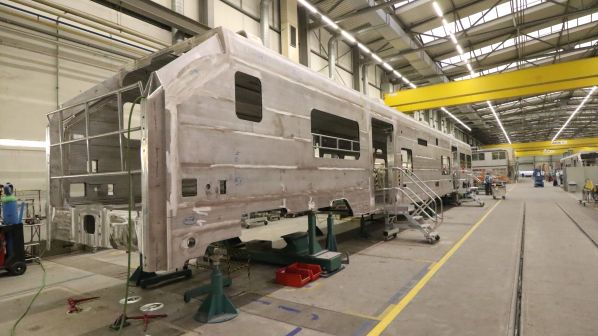THE German Railway Industry Association (VDB) has reported a mixed set of results for the German rail supply industry for 2020. While revenue for some manufacturers hit record levels, this was entirely due to contracts awarded in 2018-19 including several major export contracts. New contracts for export sales in 2020 were down by 37.5%.
Overall, the German rail supply industry represented by VDB reported turnover of €12.5bn in 2020, a 7% increase compared with 2019, reflecting the large number of orders received in the period up to 2018 as most orders take two or more years to be completed.
The rail supply industry in Germany directly employed 53,300 people in 2020, down slightly from 53,700 in 2019.
Export sales increased by 10% and domestic sales by 5%. New train and locomotive construction, including train components, remains the largest single sector of the industry, with 2020 sales up 21% to €9.2bn. Revenues from the rail infrastructure supply industry fell by 19.5% in 2020; the largest fall was in materials for domestic use in Germany which dropped 21.4% to €2.2bn.
While 2020 was a bumper year for some manufacturers, VDB is forecasting leaner times ahead. Although overall orders received in 2020 remained very strong at €14bn, with domestic orders up 23.5% compared with 2019 to €10.5bn, export orders were down 37.5% to €3.5bn with orders for new export vehicles and parts down by 42%. This will largely be felt from 2022 onwards, and VDB has expressed concern about the future viability of some export-focused manufacturers.
VDB is calling for stronger support and expenditure from government at both domestic and European level to recognise the importance of innovative technology rather than just price.
Specifically, VDB wants the German government to commit to achieving the electrification of at least 70% of the national network by 2025 and to fully introduce ETCS by 2035 which, if achieved, would imply a fourfold increase in expenditure based on current spending.
VDB suggests that to enable the transition to ETCS from 2021, all tenders for new vehicles for use in Germany should only include ETCS on-vehicle equipment and that the re-equipment of around 12,750 existing vehicles with ETCS on-board units (OBUs) is required by 2030.
“OBUs are digital infrastructure for which the federal government is responsible for financing,” says VDB president, Mr Andre Rodenbeck. “Despite support from the European Union and the federal states, Germany has so far lacked a clear perspective on promoting digital vehicle retrofitting.”

